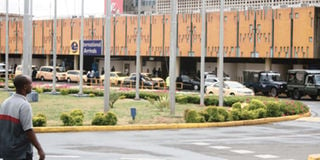Courting trouble? No Mpox screening at JKIA

The Jomo Kenyatta International Airport.
Travellers are not being subjected to rigorous screening for Mpox on arrival at Jomo Kenyatta International Airport (JKIA), Nation.Africa has learnt.
Most airports around the world are undertaking health screening or monitoring those arriving from countries most affected by the virus.
The World Health Organization (WHO) on August 14 declared the Mpox outbreak in parts of Africa, particularly the Democratic Republic of the Congo (DRC), a public health emergency of international concern.
On Monday, Kenyan delegates arriving from Kigali, Rwanda, after a week-long Africa Food Systems Forum, told Nation.Africa that the port health offices were closed. No one was screening travellers, including checking their temperatures, they said.
"I arrived on the morning flight. They just checked our passports and asked if I had a yellow fever vaccination card, nothing else," said Albert Juma.
Mercy Khavere said, “We are from a global conference where we interacted with people from around the world and just arrived at JKIA where there’s actually no one to screen us for Mpox or even ensure our body temperatures are not above 38 degrees Celsius. This makes me very concerned if at all the government is serious.”
As of August 7, four confirmed cases of Mpox had been reported by Rwanda, according to WHO.
The cases include a 33-year-old woman who frequently travels to the DRC and a 34-year-old man with a recent history of travel to the DRC.
In the case of another 39-year-old man who tested positive for Mpox, four of his close contacts have been identified and are being followed up.
Passenger accounts of laxity at JKIA corroborated the findings of a Nation.Africa team that visited the facility on September 1.
The spot check showed that port health officials were only remotely monitoring temperature sensors at the point of entry.
Health officials said they were not allowed to speak to the media, but explained in confidence what they were doing to keep Kenyans safe.
One official said they were checking the digital temperature monitors fitted with sensors installed during the Covid-19 pandemic.
"If someone passes through here with a body temperature of above 37 degrees Celsius, we will stop them and take them in for examination. We are also looking out for rashes from afar without passengers knowing it," the official explained.
“Passengers may assume that they are not being screened because we are not screening travellers on a one-by-one basis which is why we are not stopping anyone coming through for close examination. We are just making observations silently."
As hundreds of travellers passed by the port health desk, some were surprised that there was no robust screening for the deadly virus.
“When we landed, no one approached me to ask if I have travelled to places like Nigeria where there are now 44 Mpox cases,” Dennis Owino, a Kenyan traveller who had arrived from West Africa, told Nation.Africa.
“India has developed an RT-PCR kit specifically designed for the detection of Mpox and can provide results in one to two hours. Why are we not getting such kits here?” said Rajesh Patel, who travelled from India.
According to Indian health authorities, all states have also instructed airport health officers and port health officers to carefully screen passengers arriving from the DRC and other African countries.
“Any person with a travel history in South Africa, Kenya and Nigeria needs to be particularly screened. If a person has rashes and fever they require isolation… and the remaining work of screening and testing will be done by the health department," Ratan Suman, the Director of Uttar Pradesh Health Department for Infectious Diseases, said in a recent official statement.
In the United States, the Centers for Disease Control and Prevention (CDC) and the Department of Homeland Security are conducting Mpox screening at several major airports.
These include New York's John F. Kennedy International Airport, Los Angeles International Airport and Hartsfield-Jackson Atlanta International Airport.
“More than 200 staff, including epidemiologists, laboratorians, and risk communication experts, have been deployed to support response efforts in the United States and Africa,” the US CDC said in a statement last month.
Nation.Africa sought a response from Health Principal Secretary Mary Muthoni on the status of Mpox screening at JKIA.
“We have asked port health officials to come up with a protocol including screening questions that will be adopted by all airlines entering the country. We indeed need to do more; we will incorporate the protocols as guided by WHO,” the PS explained.
In 2020, before Kenya recorded its first case of coronavirus, the High Court ordered the temporary suspension of flights from China over the coronavirus outbreak, following a petition by the Law Society of Kenya.
This came after the government allowed a China Southern Airlines flight carrying 239 unscreened people into the country.
"I find that unless conservatory orders sought are granted, Kenyans will continue to be exposed to the deadly coronavirus," Judge James Makau said at the time.



